
Section Branding
Header Content
Deluxe: God's Own Bacon
Primary Content
On this episode of Salvation South Deluxe: Chuck travels to the foothills of the Smoky Mountains to meet 'the Aristotle of Bacon.' Learn how Benton's Smoky Mountain Country Hams—a humble smokehouse in Madisonville, Tennessee—caught the attention of the fine dining industry and beyond.

TRANSCRIPT:
Chuck Reece: Chuck About twenty-three-hundred years ago, the Greek philosopher Aristotle finished a work he called Nicomachean [nih-kuh-MEE-uhn] Ethics. It was his attempt to write down the guidelines for how human beings can live their best, most virtuous lives. Virtuous actions, he believed, created virtuous people.
“We become just by doing just acts," Aristotle wrote. "temperate by doing temperate acts, brave by doing brave acts.”
Okay.
Fast forward to nineteen-twenty-six, when the great American philosopher and historian Will Durant published a book that is still highly influential. It’s called The Story of Philosophy. Durant was a huge fan of Aristotle, and this was how he summed up Aristotle’s theory that virtue comes from repeated virtuous acts:
"We are what we repeatedly do. Excellence, then, is not an act, but a habit.”
So, now that we have absorbed this wisdom of the ages, let us step back for a moment and consider, in that light, one of life’s greatest pleasures:
Bacon.
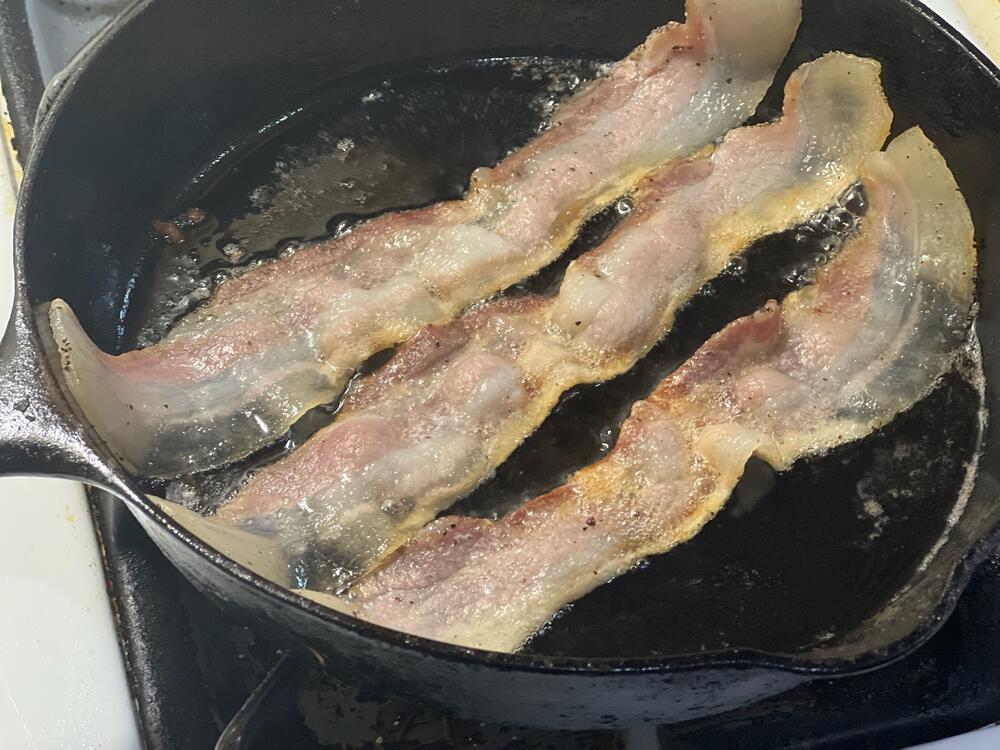
Bacon is divine. I love it. The smell of it in the morning is a call to family. A call to love. A call to the common table. Most everyone I know loves bacon. I have met a few folks who say they don’t like bacon, but they all make me nervous. I never cared much which brand of bacon was on my breakfast plate. Then one night, about fifteen years ago at a fine restaurant in Atlanta, I discovered the One True Bacon.
Bacon so singularly delicious I came to think of it in the grandest of terms. Tasting it was like holding J.R.R. Tolkien’s Ring of Power in your hand. Or Excalibur, the sword of King Arthur, or Poseidon’s trident.
It was the One Bacon to Rule Them All. It was God’s Own Bacon.
The dining establishment where I experienced this was called Restaurant Eugene, and it was run by one of the South’s most celebrated chefs, Linton Hopkins. I was on one of my earliest dates with Stacy, the woman who is now my wife. We were eating dinner, not breakfast, so there were no strips of bacon on our plates. Instead, we were eating a soup——I believe a corn chowder of some sort——that had small pieces of bacon in it.
The waiter explained what was in the soup when he served it. Then he waited for us to taste it. There was bacon in my first spoonful, and when I bit into it…
…angels sang.
“Where,” I asked the waiter, “did this bacon come from? It’s amazing.”
“That is Benton’s Bacon,” he said. “It’s made in Tennessee.” Specifically, it is made in a little town called Madisonville, in East Tennessee, about halfway between Chattanooga and Knoxville. And it has been made there, for more than forty years now, by a man named Allan Benton.
Mr. Benton is soft-spoken, neither physically imposing or arrogant in any way. But I believe——and I say this with no hyperbole intended—that Allan Benton is the Aristotle of bacon. The bacon and country hams he smokes in Madisonville are the product of four decades of virtuous repetition, continuous learning, and small improvements along the way.
Earlier this year, about fifteen years after Stacy and I first experienced Benton’s Bacon, we finally headed up to Madisonville to see how the magic happens. And we decided to take y’all with us.
This episode is gonna make you hungry.
THEME MUSIC UP
Chuck Reece: Today, on Salvation South Deluxe, we’re going to tell you a story about family. And striving for greatness. And preserving a legacy. And coming home.
And bacon. The best damned bacon in the world.
I’m your host, Chuck Reece, and Salvation South Deluxe is a series of in-depth pieces that we add to our regular podcast feed. We try to unravel, in a dee-luxe way, some untold stories of the Southern experience and let you meet some authentic Southerners, people who make this region truly unique.
THEME MUSIC OUT
ACT ONE
Chuck Reece: A few miles north of Madisonville on U.S. Highway Four-Eleven, you will see a large sign with an arrow that says “Country Ham” pointing at a cinderblock building. On the side of the building, in huge letters, it says “Benton’s Smoky Mountain Country Hams. We cure ’em.”
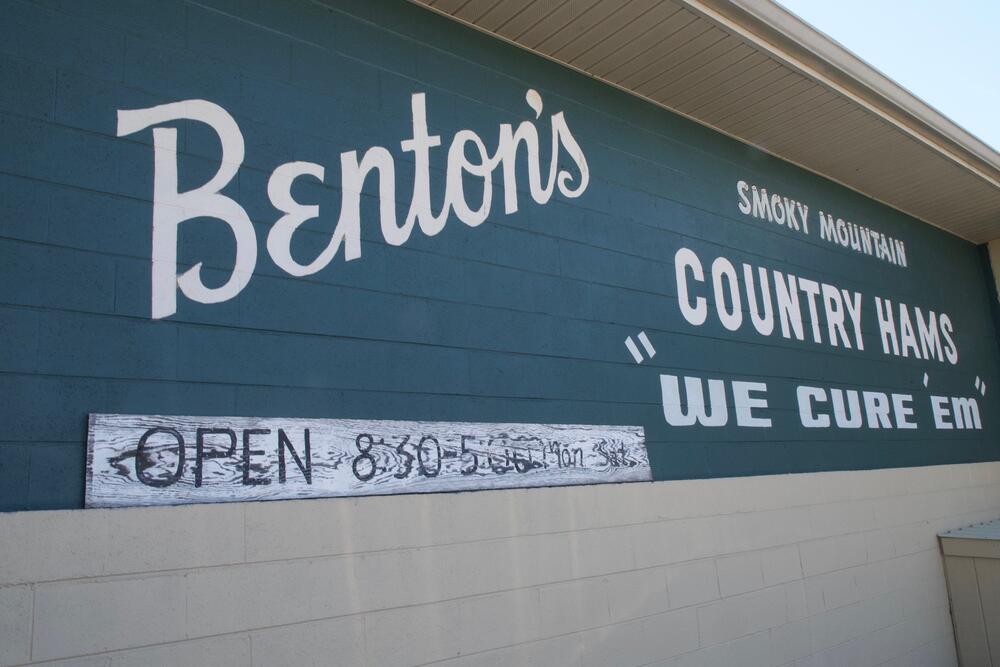
You couldn’t really refer to the whole building, which is quite large, as a “smokehouse.” But when you walk in the front door, you are overwhelmed with the aroma of smoked pork.
If you are a lover of country ham or bacon, the place smells like heaven should smell. If you don’t know what I mean when I say “country ham,” a country is dry-cured in a mix of spices, then it spends time in a smokehouse, then aged for six months or longer. It’s a method that’s been passed down for centuries in Appalachia——a way to preserve meat before the days of refrigeration.
And it was passed down to Allan Benton.
Chuck (from interview): Your granddaddy Cured hams, is that right?
Allan Benton: Both sides of the family, both sets of grandparents. They lived a mile apart in the hills of southwestern Virginia, 25 miles, I guess, from the nearest town. And they were sustenance farmers in the purest sense. They literally raised everything they ate.
They took great pride in the product because they had to live on this stuff all year long. It was one of their main sources of protein. Didn't have much beef at all, practically none. They lived mostly on pork and chicken. Didn't take a lot of land to produce either one.
Chuck Reece: Talking to Allan Benton in the small office where he’s answered the phone and taken orders for his hams and bacon for decades, listening to his stories, I am reminded of my oldest uncle, Efford Reece, about whom I have told you a couple stories on this very podcast. Uncle Efford, or Pappaw, as I called him, raised his own hogs and made his own country hams every year in a smokehouse. And the folks in my family loved to get some of his country ham every year.
Allan Benton: They took great pride in it. It was almost bragging rights as to who'd made the best bacon or the best kind of ham.
Chuck (from interview): I can imagine that.
Allan Benton: They didn't have much to feel good about, but they took pride in that.
Chuck Reece: In nineteen-forty-seven, Allan’s grandfather, Albert Hicks, started what became Benton's Bacon.
Allan Benton: Albert had a business between Madisonville and Sweetwater on old highway 68. It wasn't government-inspected, just a little hole-in-the-wall smokehouse behind his house, but he cured ham and bacon and sold it to people who came by. And he started that business in 1947. And he ran it till the spring of 1973. '
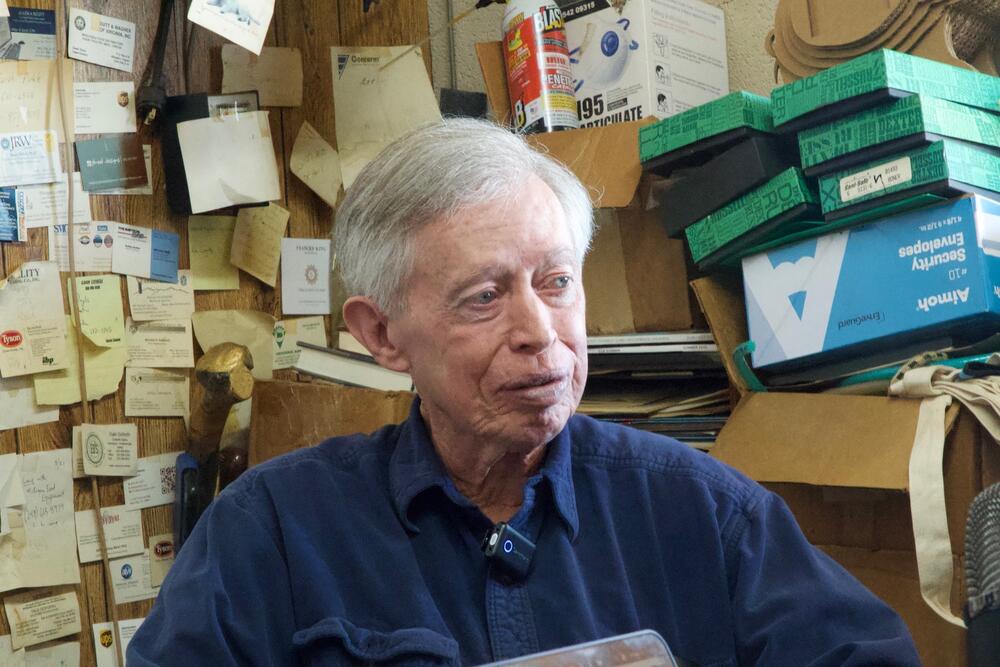
Chuck Reece: Allan helped his grandpa out in the smokehouse all throughout his youth. Then he moved up the road to Knoxville to enroll in the University of Tennessee.
Enrollment was through the roof because so many young men wanted school deferments to save them from the draft and keep them out of the war in Vietnam. As a result, dorm rooms and meals in the cafeterias were hard to come by.
Allan Benton: You could hardly ever get into a dormitory. And when I finally got in the dorm, I couldn't even get on the meal plan and I tired rather quickly of hamburgers.
After about a quarter, I had enough hamburgers, and I started just carrying country ham back to my dorm room, frying in a pan.
Chuck Reece: Which is how he learned that the smell of country ham will make you friends.
Allan Benton: You could draw a real crowd about 10 o'clock at night frying country ham in a dormitory. They come out the woodwork trying to find that odor.
Chuck Reece: But Allan didn’t plan on getting into the smoked meat business after college. After graduating from UT, he headed to Middle Tennessee State University for a graduate degree, with the goal of becoming a teacher.
Allan Benton: I taught school for a year down in Brevard County, Florida near Cape Canaveral. Again, I got hungry for home cooking and I'd call my dad. He’d go over and pick a ham up from Albert Hicks and send it to me. And I'd carry a country ham sandwich into work, and people said, “Oh my goodness, where did you get that? Lord, can you get me a ham like this?” And I'd come home and carry back three or four or five hams at a time to people that I went school with.
Chuck Reece: But it wasn’t long until Allan figured out the teacher’s life wasn’t for him.
Allan Benton: I figured out I was never gonna be able to make a living teaching school. It was…the pay was terrible. And I thought about maybe going to law school. But after I quit, reality set in. I thought, I'm gonna have to sit out a year, maybe two years to get into law school. What am I gonna do in the meantime?
Chuck Reece: About the same time, Albert Hicks started thinking about retirement plans.
Allan Benton: My grandparents were getting old and not able to fool with the hogs.
Chuck Reece: So Allan got a new idea.
Allan Benton: I went over and talked to him and talked him into leasing me the little building in his backyard. And that's where I started making ham and bacon.
Chuck (from interview): Is he the one who taught you the method?
Allan Benton: You know, I knew what we were doing at home, Chuck, but I wanted to learn more about what I was doing.
Chuck Reece: I don’t know if Allan Benton read much Aristotle in college. But this was definitely the moment when he started thinking in an Aristotelian way, as they say.
Allan Benton: I immediately wrote letters to schools all over the South. University of Georgia, Mississippi, North Carolina, Virginia. Anybody that I thought could help enlighten me because I made my mind up. If I was going to do this, I wanted to do it really well.
I learned a lot from Albert Hicks. But I also learned a lot from the food tech people at the University of Tennessee.
Chuck Reece: His earlier studies at UT never caused him to cross paths with agriculture professors.
Allan Benton: The first time I went up to that ag campus, within 15 minutes, it was like this epiphany moment. It was like a breath of fresh air. I thought, oh my gosh, if I'd only known it was like this on this ag campus. It's a totally different atmosphere. It was an incredible experience.
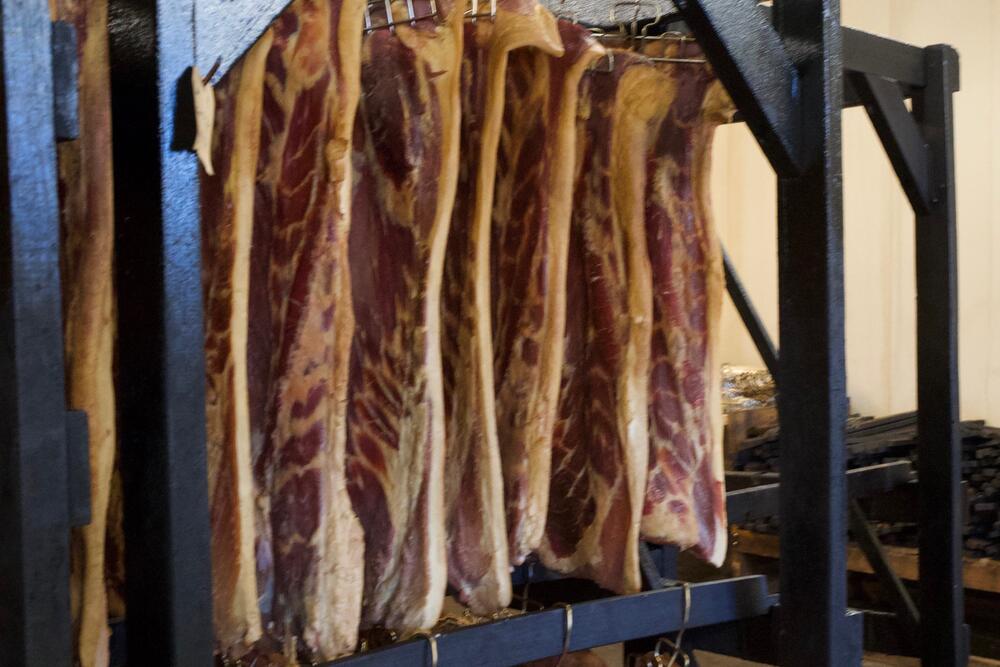
Chuck Reece: Smoking meat, putting up hams and bacon for the winter, had always been like folklore——methods and wisdom passed down from generation to generation. That’s what Albert Hicks had given his grandson. But Allan dove straight into learning the science behind those old-school methods——and how, just maybe, to improve them.
Allan Benton: Albert was old-school. He was an incredible man, brilliant guy. But he was thoroughbred old-school, always wore a hat, as gentlemen of his era did. And usually had a cigar in his mouth, usually wasn't even lit, he just wallowed around.
Chuck Reece: And Albert was an old-school guy of the sort who believes that those who can, they do, and those who can’t, they teach.
Allan Benton: He looked at me one day, he said, “Boy, you fool with them educated fools, you'll soon be out of business.” Well, I knew that they weren't exactly educated fools. And I followed their advice to the letter. I hung my hat on every word that they spoke. And I solved this foolish problem that he never did understand.
Chuck Reece: The problem was spoilage. The way Albert did things, not every ham he hung up to age wound up being edible.
Allan Benton: I got on a first-name basis with a lot of the people, a lot of those professors in the Food Technology Department up there. And I immediately started talking about the spoilage problem he had. And I figured out why he was losing meat, with the help of those professors.
I was young and wet behind the ears, but I started out wanting to make country ham and bacon as good as anybody in the world was making it. The Chinese, the Europeans, anybody. I wanted to do it as well as anybody.
Chuck Reece: There's an old saying that goes: “Fast. Cheap. Good. Pick any two.”
Allan Benton continuously improved his methods for eight years, and his bacon and hams tasted better and better.
But the folks who were okay with fast and cheap smoked pork were getting the business. Allan was aging his country hams for fifteen months before he sold them. They tasted divine, but he had competitors who were aging their hams for the bare minimum of three months.
Allan Benton: And if somebody was three or four cents cheaper per pound than I was, they'd buy their ham instead of mine. I was starving to death in this business.
Chuck Reece: After nearly a decade of learning and improvement, Allan was about to give up on his dedication to quality. Then his daddy gave him a talking-to.
Allan Benton: My dad was an old World War II guy and was sitting on that bench out front. And man, I was barely hanging on. I walked up, he was sitting there and I said I think I may have to speed up my curing process like my competitors.
He looked up and he said son if you play the other guy's game you always lose. He said make the product the best you know how, no matter how expensive the process. And he said, sooner or later, quality will sustain you in this business. I swallowed every word he said hook, line, and sinker because I knew he was right. And I never looked back…
Chuck Reece: I bet you’re thinking, this is the point in the story where something unexpected and wonderful happens.
Allan Benton: …and we struggled for another 15 years after that.
Chuck Reece: When we come back, we'll tell you the story of how Allan Benton survived that long, rough patch.
Not only did he survive, but he became so successful that a couple of years ago, his son Darrell decided to leave his job——as a doctor, a radiologist——to enter the family smokehouse business.
You're listening to Salvation South Deluxe.
MIDROLL BREAK
ACT TWO
Chuck Reece: When we left Allan Benton before the break, he was describing how, after his father convinced him to stick with his dedication to quality, he faced fifteen more years of struggle.
Which brings the Benton story into the early nineteen-nineties. In those years, about an hour northeast of Madisonville, in a little community called Walland, the Beall family was expanding the little six-room country inn they had operated since the late seventies into a full-scale resort. A world-class, high-end resort called BlackBerry Farm.
In ninety-two, the Bealls hired a young North Carolinian named John Fleer to be Blackberry Farm’s executive chef. Fleer was freshly graduated from the Culinary Institute of America in upstate New York.
Fleer and the Beall family wanted the food they served to be grown, raised, and prepared right there in the Smoky Mountains of East Tennessee. Their resort sits on forty-two-hundred acres, and they farm that land, growing their own crops and raising their own livestock. They wanted to serve the very best of local products, regardless of their cost.
Fleer discovered Benton’s Bacon in nearby Madisonville and began incorporating Allan’s products into the Blackberry Farm menus. Then Fleer recommended Benton’s to another chef, a friend in New York City whose name you will know. That is, you will know it if you have ever watched the TV show Top Chef: Tom Colicchio, the show’s head judge for all of its twenty-two seasons. Colicchio ran the kitchens at two legendary Manhattan restaurants, first Gramercy Tavern, and then Craft. When Colicchio called up Benton's to place his first order, Allan was ecstatic.
Allan Benton: I had three employees and I bounced all over the building really excited. I said, you guys won't believe this, but I've just taken the order from this guy in New York City. He probably doesn't know what he's getting, probably never buy anything else, but at least we can brag and say we shipped it to New York. Three weeks to the day from when I sent him his first order, I was selling to seven restaurants in New York City.
Chuck Reece: And just like that, this humble smokehouse in the foothills of the Smoky Mountains had traveled all the way to the Big Apple and entered the world of fine dining. Back at Quillen College of Medicine, where Allan’s son Darrell was studying, his dad’s phone calls were bringing exciting news, not only about the new customers, but also the national food magazines that were wanting to write about Benton’s.
Darrell Benton: I don't think I realized THE kind of the exposure that his products had gotten and the following that they'd gotten, just because I wasn't as closely involved with the business at that point. You know, my parents would send me a link or, you know, send me a copy of a magazine. So I started to get an idea. Of course I was always proud to see that kind of stuff.
Chuck Reece: As it turned out, this was only the beginning. Word about Benton’s bacon and country hams was spreading among young chefs with big aspirations in New York City.
Allan Benton: One of them was a young chef who had actually been working for Tom. He walked in and smelled them preparing that first order. The first shipment I sent up there. And he said, what in the world is that aroma? And he went straight to the phone … and placed his first order with me. David Chang.

Chuck Reece: David Chang is the Korean-American celebrity chef who rose to prominence with his Momofuku restaurant group and three different shows on Netflix. The late chef Anthony Bourdain, on his PBS show Mind of a Chef, had Chang talk about Benton’s bacon.
David Chang (from Mind of a Chef):When I first tasted Allan Benton's bacon, it was one of those experiences where it was like a first time experience. Like, wait a second, what have I been doing? What have I been eating my whole life? This is the real thing. This was just a punch-me-in-the-mouth type of experience. It's extraordinarily smoky and it's salty. It just tastes like what bacon should be.
Chuck Reece: Chang turned out to be one of the most important proponents of Benton's Bacon.
Allan Benton: I've probably picked up 500 accounts because I sell to David Chang. I would get a phone call and somebody would say, hello, my name's so-and-so, I'm a chef in Dallas or Seattle or wherever they're from, and I was in New York over the weekend. I knew what was coming next. I ate with David Chang, can you sell me this product? And I literally couldn't repay David if I tried.
Chuck Reece: So here was Allan Benton, suddenly selling his products to the some of the most elite fine-dining chefs in the world, but Allan and his wife Sharon had never themselves sat down to one of those chef’s meals.
Allan Benton: In fact, I didn't know for sure what a fine dining restaurant was until John Fleer invited Sharon and me up for a meal at Blackberry Farm. he had asked to meet us. He said I want you to come up and have a meal with us and we'll show you what we're doing with your product. That was my first fine dining experience.
He served scallops in a bacon consommé. I can close my eyes and still remember the texture and the flavor of that meal. It was amazing.
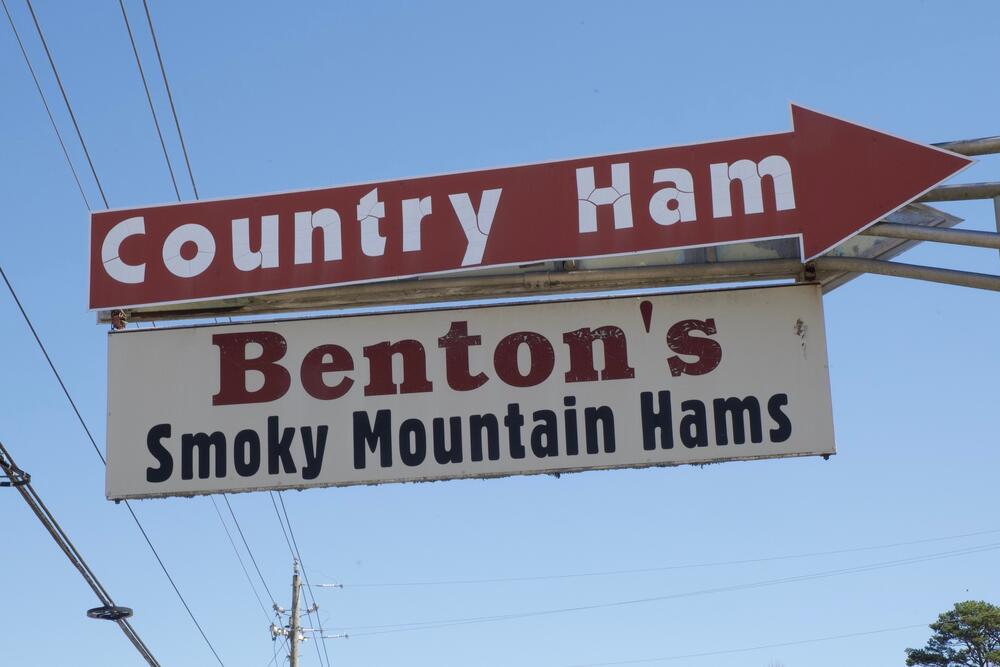
Chuck Reece: It’s now about a quarter-century since Benton’s Smoky Mountain Country Hams stopped struggling to stay open. These days, every week, Benton’s goes through four to six hundred hams a week. And the pork bellies from which they make bacon? Benton’s buys between ten and fourteen thousand pounds of pork belly every week.
Benton's now ships its bacon to restaurants and home cooks everywhere, plus two varieties of country ham, one aged for 15 months after curing and smoking, the other aged for more than two years, which puts them in the league of delicacies like Parma, Italy’s prosciutto and Spain’s jamón ibérico. But you will not find Benton’s products at your local supermarket. To keep the level of quality high, Benton’s can’t increase its output enough to supply the giant supermarket chains.
Allan Benton: We've stayed away from it intentionally. We don't want to pick up an account and not be able to do business in a proper way. And we're too small, we think, to try to do this with supermarkets. We've turned down some of the big names to work out there in the supermarket world because we feel like that's not who we are. There's about four big grocery store chains that come to mind real quickly that begged for it for a while. I don't hear from them anymore. I think they finally gave up.
Chuck Reece: It takes a lot of confidence to say "no" to a major grocery store contract like Allan Benton has had to do many times over the years. Allan’s son Darrell remembers the rough days when he was growing up and nobody outside East Tennessee knew about his father’s products.
Darrell Benton: It was a struggle to survive and keep the lights on in here. He was working seven days a week. long hours, that was pretty much my whole childhood, and I saw very little of him. And it was hard work. Around the holidays, we'd be out here from midnight slicing bacon, making sausage, doing anything we could to survive in the business.
When I was in high school, I'll tell you, nobody had ever heard of us. We were just selling to local folks here. I'd have to come out here and work after school. And back then it wasn't too cool to go out on a date Friday night smelling like smoked bacon.
Chuck Reece: In those days, Allan wasn’t thinking much about bringing his children into the family business.
Darrell Benton: My parents, I mean, we were encouraged to find a better way of life. It didn't seem like a viable option one time.
felt called into the medical field, went to medical school, did a residency in radiology and a fellowship after that, and practiced medicine for about seven years.
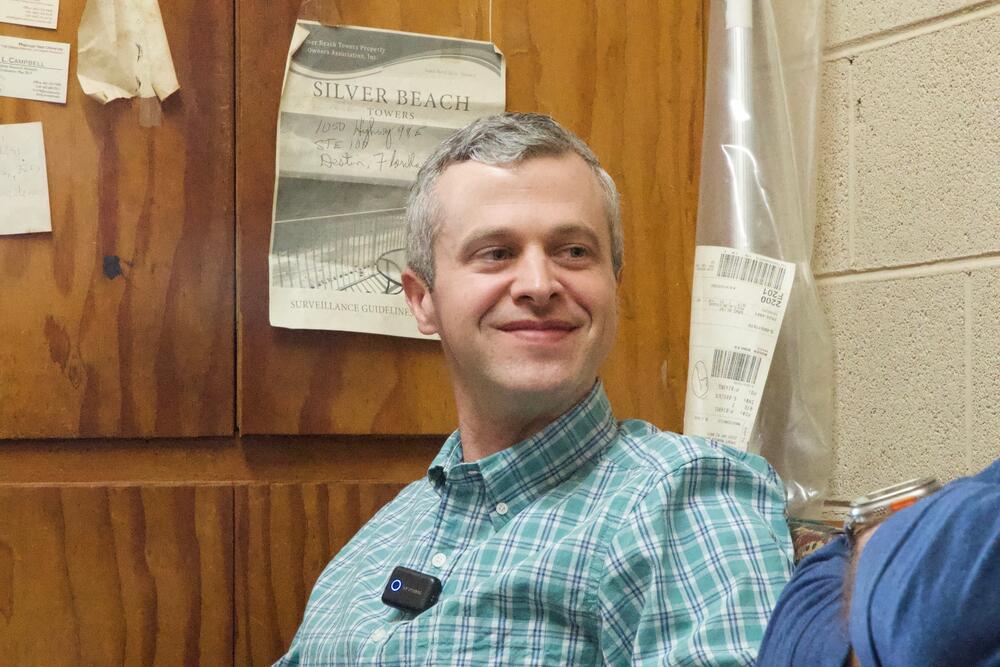
Chuck (from interview): Were you one of those mountain kids like me who thought he wanted to get out of living in the country and do something bigger?
Darrell Benton: I didn't necessarily want to get out of the country. Country's in my blood, but I grew up working in this business. From the time I was seven or eight years old, I was out here labeling packs of ham and bacon——those first 30 or so years that my dad was in the business.
Chuck Reece: But when Darrell was up the road in Knoxville, making great money practicing medicine, he found himself dreaming not of expanding his radiology practice. Instead, he dreamed about bacon.
Darrell Benton: I missed this work. It's in my blood, you know. I'd be at the hospital and start getting thoughts of that smoke rolling out of the smokehouse and loading the wood stove, the sights, the smells, the people, trying to shake it off. … But it's something that I couldn't get out of my blood. So finally I couldn't ignore it any longer. I hung up my white coat, went from curing people back to curing bacon. And I'm the happiest that I've been in a long time.
Allan Benton: It caused me heartburn at first. I thought he had it made as a doctor.
Darrell Benton: I called him, Chuck, and told him that I'd left my group——I was a partner in a private practice up in Knoxville——and I let him know that I was going to be leaving to come back here. He said, “Son, what have you done? You make good money, you've got all this vacation time.” He said, “I’ve been in business for 50 years and I've taken one or two vacations. Are you sure?”
After I’d been down here for about six months, he saw how happy I was, and I drive to work smiling every day and drive home the same way. And I think now he knows how much happier I am and I think he's glad I made the switch too.
Chuck (from interview): Do any of your old doctor friends tell you that you're an idiot?
Darrell Benton: No. They tell me they're jealous.
ACT THREE
Chuck Reece: Once you’re inside the front door of the Benton’s building in Madisonville, all you see is a shopping area. There is a butcher counter with refrigerated meats, a cooler with some refrigerated goods, and some baskets filled with vacuum-sealed packages of bacon and slices from country hams.
But if you go through the back door of that lobby area, you see where "where the sausage gets made". I’m sorry about that, I just couldn’t resist saying it.
The process with the hams and with the pork belly slabs that become bacon begins with curing. That means they get rubbed with seasonings. For the hams, it’s a simple mixture of salt, brown sugar, black pepper, red pepper.
Allan Benton: Now I'm forced to use sodium nitrite…on a country ham. T USDA requires a salt content of 10%. There is no such requirement on the bacon. So our bacon is made only using salt and brown sugar, exactly like my grandparents did.
Chuck Reece: After the meat has had time to absorb the seasonings, it is hung on racks with wheels and rolled into the smokehouse, which is actually one large, sealed room in the building into which smoke from a hickory-wood fire that literally never goes out is piped.
Stacy and I stand for just a moment in front of the smokehouse doors as Darrell opens them. The smoke is so thick you can barely see the meat hanging inside.
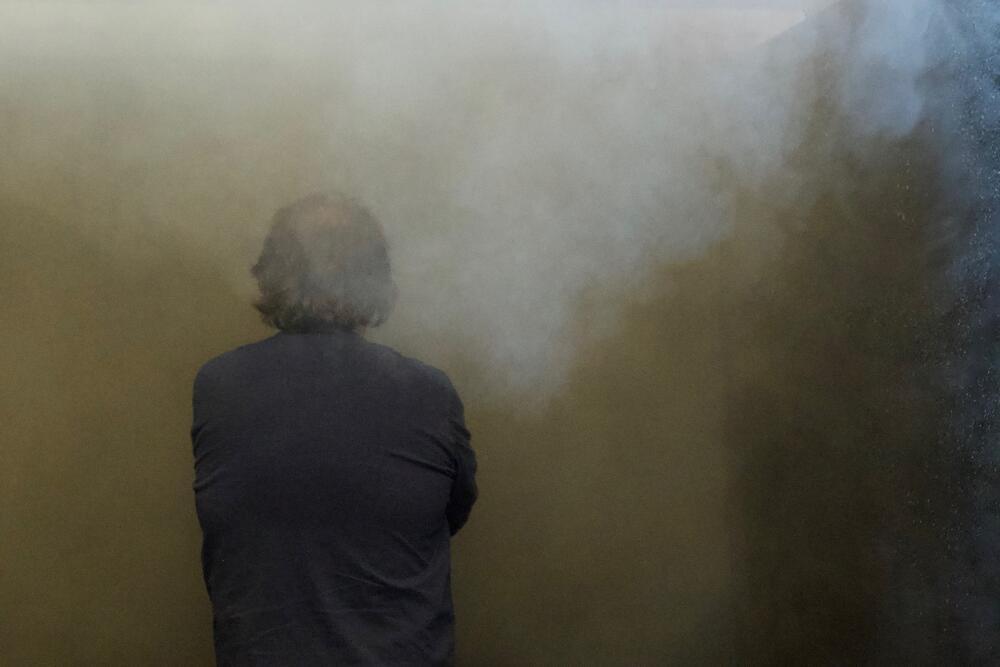
After the prescribed time absorbing smoke, the hams and pork bellies go into various aging rooms that are maintained at various temperatures to match the cycles of nature.
Chuck Reece: The Bentons’ reputation today is such that they take on some custom smoking jobs for certain chefs. In the first aging room, Allan and Darrell point out a certain whole ham hanging on a rack. Attached to it is a paper tag that shows a date in twenty-twenty-three and the name “Sean Brock.”
Sean Brock, of course, is one of the most prominent chefs in the South, the winner of multiple James Beard Awards who first made his name with his restaurant Husk in Charleston. Brock now runs three restaurants in Nashville——Joyland, Audrey, and June. Allan says he’ll keep the ham on the rack until Brock is ready to come get it.
The fuss that such chefs make over the traditional Appalachian methods of the Bentons still surprises them.
Darrell Benton: Growing up, we just ate country ham and bacon with traditional Appalachian food. Beans, greens. I'd never really been exposed to much fine dining. Growing up, times were lean, as we've talked about.
Chuck Reece: One of Darrell’s earliest exposures to what high-end chefs could do with his father’s products came when he was in medical school.
Darrell Benton: I was in medical school up in Johnson City and my dad called me. He said he was going to a dinner at a restaurant called the Townhouse in Virginia. Sean Brock was coming in to do a special dinner there. And dad had been invited because they were featuring his products. And he let me tag along. He said, I think you need to come and check this out. I had never been exposed to any food like that in my life. It's still one of the top five meals I've ever had in my life. I can remember it the look, how it tasted, everything about it to this day. It was really eye-opening to see you know a hillbilly product like we make used in such a unique way.
Chuck Reece: I remember just as vividly the first time I tasted Benton’s bacon in that fancy soup in Atlanta fifteen years ago. In the years following, Stacy and I got to taste it occasionally when we were out for dinner where a chef was using it in a dish.
After a while, I started thinking how wonderful it might be to just have some in my own kitchen to fry up for breakfast with some scrambled eggs. So I got on the Benton’s website and put in the minimum order——four pounds. Getting a Benton’s bacon delivery gives you an experience you might never have thought possible——to walk out to your mailbox, open it, and be completely overwhelmed with the delicious aroma of bacon. And of course, that’s nothing compared to the smell of that bacon cooking in my own skillet. I now enjoy that on the regular.
But preparing this show for y’all gave me the first chance I’d had to visit the Bentons up in Tennessee. And here’s a secret: If you go there, you will find products for sale that are not available on the website because of shipping challanges. Like country sausage, like the kind that you make into patties and cook for sausage biscuits.
And I did come home with a little sausage. Stacy made biscuits and lord have mercy, the result was amazing.
But the best thing I came home with was the lessons. That a time-worn, traditional, preservation method, born of the needs of Southerners who were just struggling to feed their families, can attract the attention of the fanciest people in New York or Los Angeles or Seattle.
And that the repeated actions required to maintain that method has the power to bring people home, to make a family closer.
Darrell Benton: Sometimes your calling changes, mine did. Coming back into the business is... It's been a great change in more ways than one. During my childhood, I didn't get much time with my father. Since I'm back, I get to see him every day. It's kinda like a second chance at catching up on some of that, and I think we both enjoyed it. It's also given me more time and flexibility with my own two young children.
Chuck Reece: Would Aristotle call that virtuous? Probably so.
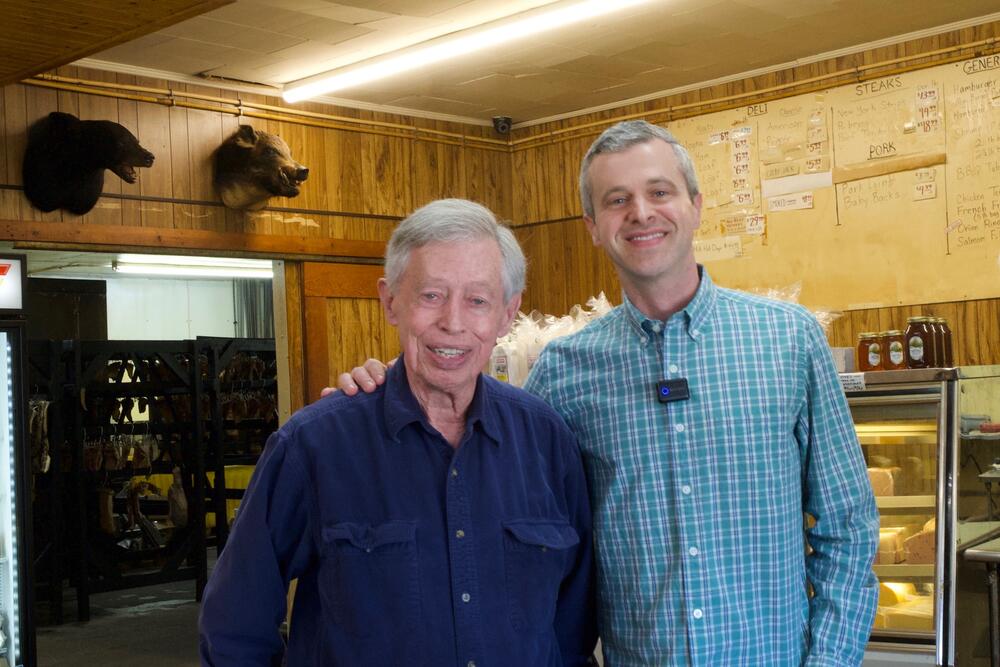
CONCLUSION
Chuck Reece: We’d like to thank Allan and Darrell Benton for their hospitality when we visited them. They are both good-hearted mountain people like the kind I grew up with.
Also, I should thank Chef Linton Hopkins here in Atlanta for making my discovery of Benton’s bacon possible all those years ago.
You’ve been listening to Salvation South Deluxe, proudly produced in cooperation with Georgia Public Broadcasting and its network of twenty stations around our state. Every Friday, we add a new three-minute commentary about Southern stuff to our podcast feed, and every month or so, we add longer, dee-luxe stories, such as the one we’ve just told you.
I’m Chuck Reece, your host and the editor-in-chief of Salvation South, which you can find twenty-four-seven at Salvation South dot com.
Our producer is the mighty Jake Cook, who also composed our theme music. GPB’s director of podcasts is Jeremy Powell, and none of this could have happened without wonderful people like GPB’s Sandy Malcolm, Adam Woodlief and Bert Wesley Huffman.
We’ll be back next month with another full-length episode of the Salvation South Podcast.
---
Salvation South editor Chuck Reece comments on Southern culture and values in a weekly segment that airs Fridays at 7:45 a.m. during Morning Edition and 4:44 p.m. during All Things Considered on GPB Radio. Salvation South Deluxe is a series of longer Salvation South episodes which tell deeper stories of the Southern experience through the unique voices that live it. You can also find them here at GPB.org/Salvation-South and wherever you get your podcasts.







